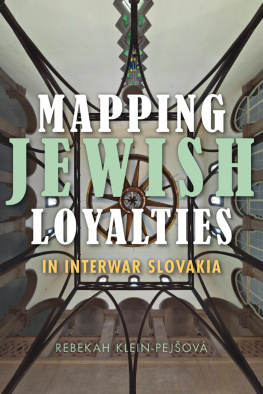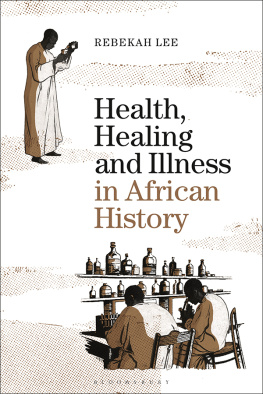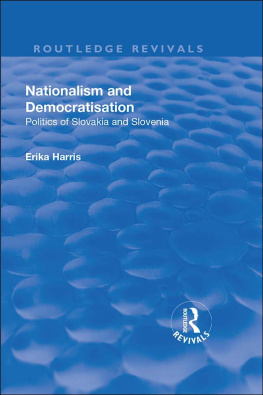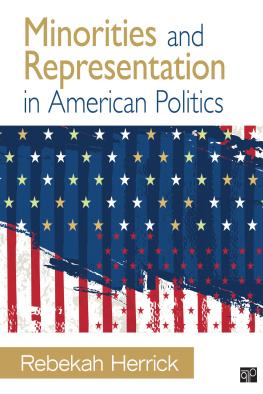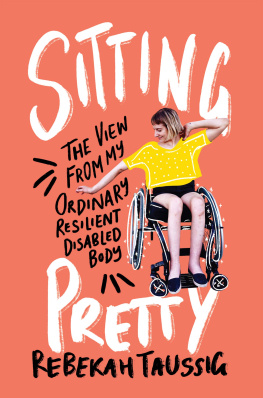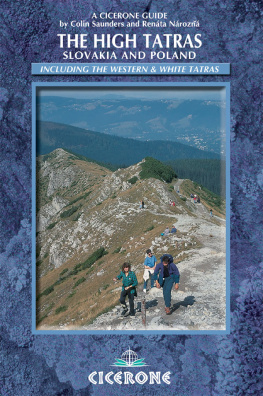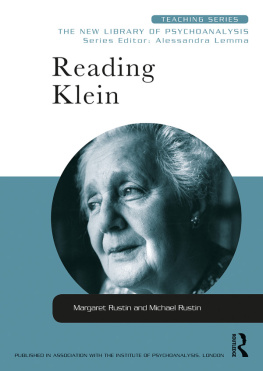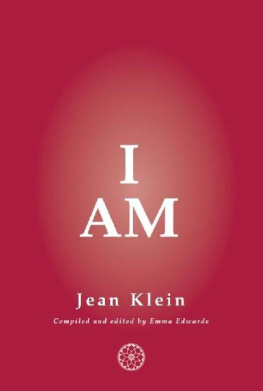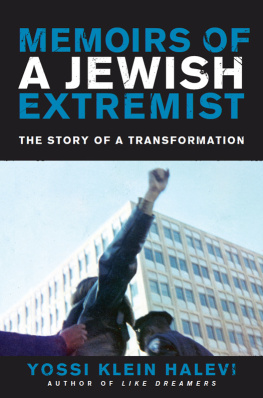This book is a publication of
INDIANA UNIVERSITY PRESS
Office of Scholarly Publishing
Herman B Wells Library 350
1320 East 10th Street
Bloomington, Indiana 47405 USA
iupress.indiana.edu
2015 by Rebekah Klein-Pejov
All rights reserved
No part of this book may be reproduced or utilized in any form or by any means, electronic or mechanical, including photocopying and recording, or by any information storage and retrieval system, without permission in writing from the publisher. The Association of American University Presses Resolution on Permissions constitutes the only exception to this prohibition.

The paper used in this publication meets the minimum requirements of the American National Standard for Information SciencesPermanence of Paper for Printed Library Materials, ANSI Z39.481992.
Manufactured in the United States of America
Library of Congress Cataloging-in-Publication Data
Klein-Pejov, Rebekah, [date] author.
Mapping Jewish loyalties in Interwar Slovakia / Rebekah
Klein-Pejov.
pages cm. (The modern Jewish experience)
Includes bibliographical references and index.
ISBN 978-0-253-01554-9 (cloth : alkaline paper) ISBN 978-0-253-01562-4 (ebook) 1. JewsSlovakiaHistory20th century. 2. JewsCzechoslovakiaHistory20th century. 3. SlovakiaEthnic relations. 2. CzechoslovakiaEthnic relations. I. Title.
ML420.H25B76 2015
782.42168092dc23
[B]
2014021653
1 2 3 4 5 20 19 18 17 16 15
For Zora and MilenaOur Jews are clever enough to seek the right path, and I think they will find it, even if they have not yet given any indication of their decision to do so.
Vavro robr, minister plenipotentiary for Slovakia, 1920
Acknowledgments
If this is a book about changing borders and how peoples lives are remade within them, then so, too, do its origins reveal the profound influence of transformed geopolitical realities on my own. The long journey toward this book began when I studied in Budapest as an exchange student from Bard College at Etvs Lornd Tudomnyegyetem (ELTE) in 1993, encouraged by Karen Greenberg, Leon Botstein, and friends in Bards exceptional Program in International Educationalways striving for true reciprocity. It was a period of great openness, mutuality, excitement, and discovery that I will always cherish. I decided then to write my senior project on late nineteenth-century Dualist Era Hungary Jewrythe Golden Age of Hungarian Jewry. My sage adviser, David Kettler, recommended that I make it more interesting by extending my period of study through the postwar chaos and anti-Semitic legislation, which I did. In the process I became acquainted with Indiana University Press, the first academic press of which I was cognizant, through William O. McCaggs A History of Habsburg Jews, 16701918.
Later I wrote my MA thesis at the Central European University in Budapest on the comparative responses of Jews in Austria-Hungary to the early Zionist movement, in order to understand the appeal, or lack thereof, the concept had for Jews in Vienna, Prague, and Budapest. This was a formative period in all respects, where scholarly growth and common socialization went hand in hand. I am grateful to have had the opportunity to work with Pter Hank, Viktor Kardy, and Andrs Ger. The variations in Jewish culture, society, politics, and levels of integration became clearer to me after I moved to Prague and learned that for Jews there the interwar period was their Golden Age and President Masaryk was their hero.
After a tour-guiding stint and work at the Jewish Museum in Prague, I went to Columbia University to study the distance between these two narratives, to compare the experience of Hungarian and Czech Jews in relation to each other and to the surrounding society. I wanted to understand the ruptures and continuities across the cataclysm of the First World War. The answer, of course, was Slovakia. I wrote this book because I wanted to know what happens after empire, after the borders change; how Jews closely tied to Hungarys prewar successes also experienced its failure, and whether they, too, had a chance at another Golden Age in Czechoslovakia before it disintegrated.
My heartfelt gratitude goes to Istvn Dek for guidance and inspiration from the moment I set foot on Columbias campus. Michael Stanislawski, my sponsor, provided crucial direction and perspective. My special thanks must go to Bradley Abrams, devoted mentor and scholarly community builder, and to Nancy Sinkoff, whose invaluable assistance eased my transition to academic mom and who models how to keep this maximalism in balance. My sincere appreciation goes to Hillel Kieval, Marsha Rozenblit, Mark von Hagen, Mark Mazower, Attila Pk, Yeshayahu Jelnek, Andrs Kovcs, Andrs Bozki, Ivan Sanders, Karen Barkey, Rebecca Kobrin, Paul Hanebrink, and Benjamin Frommer for their support, encouragement, and stimulating conversation. I wish to thank Carol Rounds for Hungarian language training at Columbia as well as Jana Navrtilov and Lubica Banov of the Institute of Language and Academic Preparation for Foreign Students (UJOP) of Comenius University in Bratislava for Slovak language training. I enjoyed valuable conversations with Ivan Kamenec, Eva Kowalsk, Elena Mannov, and Will Kymlicka at crucial stages in my research.
The research and writing for this book were generously supported by a number of institutions to whom I am sincerely indebted. First and foremost my thanks are due to the East Central Europe Center and Harriman Institute at Columbia for the Meier Fellowship, the Junior Fellowship, and summer travel grants. Foreign Language and Area Studies (FLAS) fellowships in the summer of 1999 for Czech and academic year 20012002 for Hungarian allowed me to improve my language skills and carry out archival research. Funding from the Center for Historical Social Sciences at Columbia and a fellowship from the Hungarian Eurpa Intzet in 2002 enabled me to continue my research and engage with a vibrant scholarly community in Budapest. Accommodations at the dorm of the Slovak Academy of Sciences in Bratislava greatly facilitated my research at the Slovak National Archives and the City Archives of Bratislava. I am grateful for the award of the ACLS Dissertation Completion Fellowship in East European Studies in the academic year 20052006. My thanks also go to the Institute for Israel and Jewish Studies at Columbia for an award of a fellowship from 2004 to 2007.
I acknowledge with gratitude the assistance of the chief archivist, Dr. Lajos Gecsnyi, and all of the staff in the K148 section of the Hungarian National Archives, the librarians at the Szcsenyi National Library, at the Hungarian Academy of Sciences, and at the Central European University. I am indebted to chief archivist Dr. Peter Magura and his staff at the Slovak National Archives for their rapid and painless delivery of materials, the staff of the Archive of the City of Bratislava, and the library of the Slovak Academy of Sciences. I wish to express my thanks to the archive of the Ministry of Foreign Affairs in the Czech Republic and to the librarians at the Klementinum, the Czech National Library. The staff of the Dorot Jewish Division of the New York Public Library was invaluable for its assistance as were the YIVO Institute for Jewish Research and the Center for Jewish History in New York City overall. It was a joy to use the rich collections of Columbia University and the Jewish Theological Seminary and to write in various corners of Butler Library.
 The paper used in this publication meets the minimum requirements of the American National Standard for Information SciencesPermanence of Paper for Printed Library Materials, ANSI Z39.481992.
The paper used in this publication meets the minimum requirements of the American National Standard for Information SciencesPermanence of Paper for Printed Library Materials, ANSI Z39.481992.
